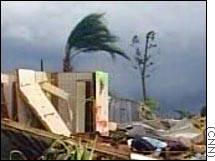NEW YORK (CNN/Money) -
In the wake of a disaster like Hurricane Charley, fraud artists come quickly out of the woodwork to prey on shell-shocked storm victims.

With 20 Florida counties eligible for federal disaster assistance, the bill for Charley-related home damage alone may surpass $11 billion. Big money like that always attracts the unscrupulous, looking to glom onto some of it, according to Frazier Engerman, spokesman for State Farm Insurance, the state's largest insurer of homes and vehicles.

Many scams will involve contractors. As thousands of Floridians rebuild, home-repair specialists will doubtless be in short supply for months. Meanwhile, the desire of homeowners to return quickly to normal can lead them to make hasty decisions -- a perfect situation for deception.
Consumers have to "do their homework before choosing a contractor," Engerman says.
Ed Sparkman of the National Insurance Crime Bureau (NICB) says there are many indicators consumers should keep in mind to identify possibly fraudulent contractors.
Having no local office or phone number is a big red flag, as is when the contractor offers too low a price for the job. It may mean he just wants to take your first payment and disappear. Beware if he offers incentives such as covering your insurance deductible. Another bad sign is if the estimate is given as one lump sum, rather than itemized.
Other advice from Engerman and the NIBC to help protect Charley's victims from fraud includes:
- Don't unduly rush into things. Get more than one estimate. Don't let a contractor push you into signing a contract immediately.
- Demand references and check them carefully. Call the local trades council and Better Business Bureau to ask about the contractor. Also, State Farm and some other insurers maintain lists of contractors they work with, and they'll provide the list to clients.
- Get estimates and guarantees in writing. Make sure to include all the details such as cost, work to be done, when jobs will be completed, guarantees, payment schedule, and other expectations.
- Never sign a contract that has any blank spaces. These can be filled in with unacceptable terms later.
- Never pay a contractor in full or signing a completion certificate until the work is finished.
Check out the charities
Other fraudsters will target those not directly affected by Charley, but who feel for its victims. Phony charitable solicitation callers spring up after such natural disasters to play on the sympathies of people, getting them to contribute to "charities" that send little or nothing to people in need.
Before contributing to any unfamiliar charity:
- Check out at the Better Business Bureau's Wise Giving Alliance Web site (www.give.org) or call the alliance at (703) 276-0100. They have comprehensive information on more than 500 national charities. There are other Web sites, such as CharityNavigator.org and MinistryWatch.com, which rate the effectiveness of various non-profit groups.
- Ask for a financial statement or annual report. A legitimate organization should be willing and able to furnish these.
- If you do decide to contribute, make checks payable to the organization, not to an individual. Never donate cash.
Bennett Weiner, chief operating office of the BBB's Wise Giving Alliance says watch out for solicitations that appeal to emotion following a disaster like Charley. Instead, ask what the charity is doing to address the problem.
Weiner says to never give out credit card information to an unknown phone solicitor. And don't yield to excessive pressure; it's often an indication that the charity is not legitimate.
Resist temptation
One irony of disaster-related fraud is that disaster victims themselves sometimes indulge in it.
According to the NICB, property/casualty insurance fraud totals $30 billion a year in the United States and it's especially prevalent in the wake of storms like Charley. After widespread losses, policyholders may be tempted to exaggerate or falsify claims, knowing that insurance adjusters may have more claims on their plate than they can properly investigate.
Sparkman says there are two types of consumer frauds: hard fraud, in which the claim is completely illegitimate, and soft fraud, in which a loss has occurred but its extent is embellished. The latter is much more common, he says.
Policyholders should not allow contractors or others to talk them into filing fraudulent claims. Engerman urges them to be scrupulously honest when it comes to their insurance dealings. Not only can fraud result in a policy being cancelled, the policyholder could also end up with severe legal consequences -- including jail.
Although insurance companies don't tend to pursue purveyors of soft fraud as much as hard, if you're found to be exaggerating a claim it could mean lost insurance coverage, legal bills, and the living hell of a criminal prosecution. For a small amount of extra money, that's hardly worth it.

|

